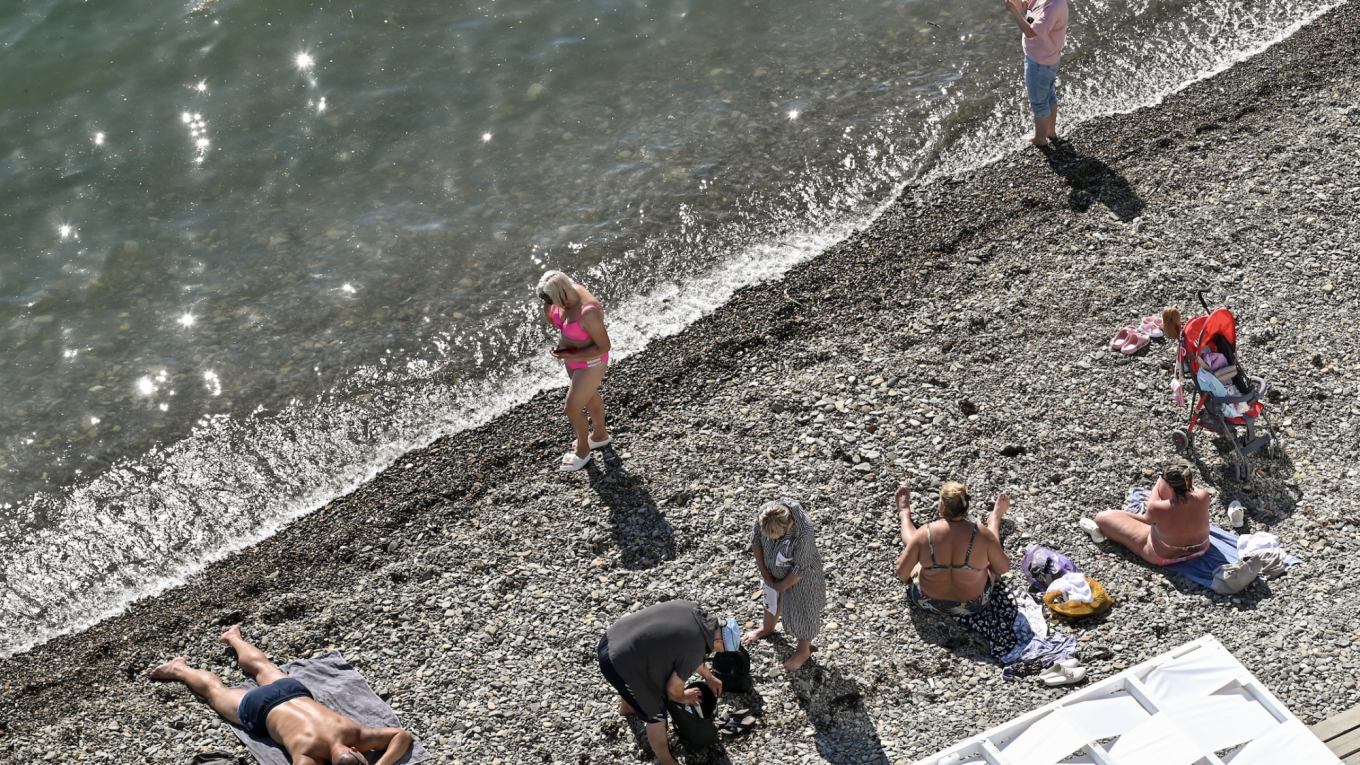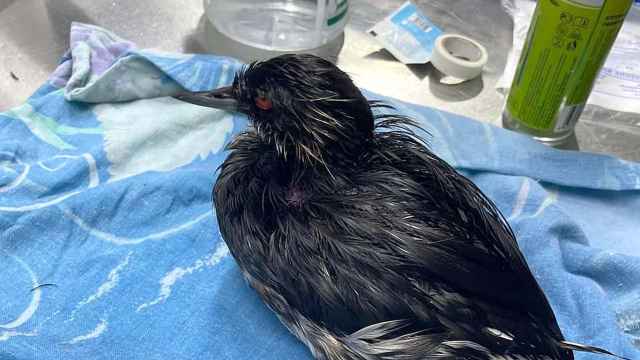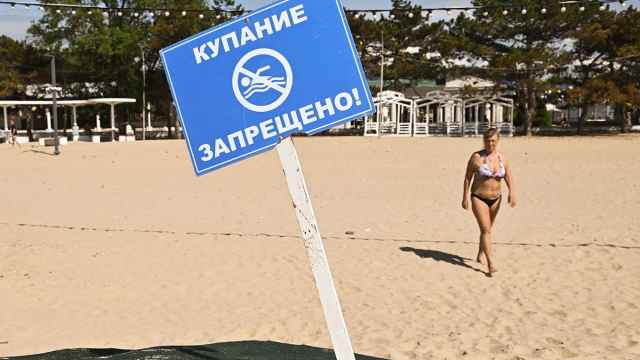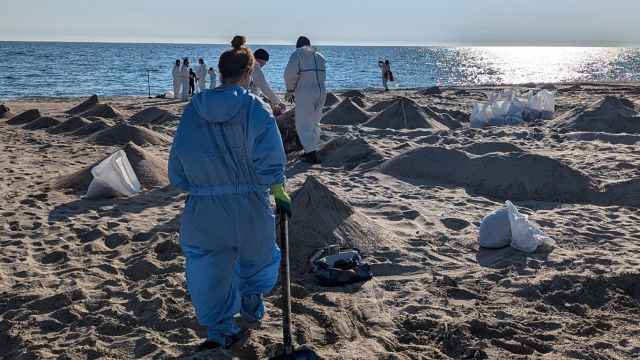Every summer, vacationers flock to the beaches of Russia’s Black Sea coast to soak up the sunshine and warm climate that evades much of the rest of the country.
For many, not even one of the worst environmental disasters in Russian history is enough to keep them away.
In late December 2024, two aging oil tankers sank during a storm in the Kerch Strait between the annexed Crimea peninsula and Russia’s Krasnodar region, spilling thousands of tons of mazut, a type of heavy fuel oil.
Since then, local authorities, volunteers and residents have been battling to clean up the fuel, which is toxic, difficult to remove and poses serious threats to marine life and coastal ecosystems.
Beyond the environmental damage to the sea, the spill of 2,400 tons of fuel oil across roughly 50 kilometers of coastline has raised serious concerns about whether it’s safe to vacation at Black Sea resorts.
Russia’s health watchdog Rospotrebnadzor said beaches in the Anapa area “remain at risk” following the sinking of the Volgoneft 212 and Volgoneft 239 tankers. But despite an ongoing ban on swimming, tourists have been seen enjoying the waters anyway.
For many Russians, the Black Sea coast remains one of the country’s most popular summer holiday destinations. And for local residents, the issue is deeply tied to their livelihoods, as many rely on the tourism high season to make a living.
“It’s just despair,” local resident Katerina Zakharova wrote on the VKontakte social media site. “Many people in our town depend on tourism. What are we supposed to do this year? How do we survive and feed our families?”
"The fear for the environment has already passed, thanks to the volunteers. The sand is clean, and the sea is full of fish and dolphins,” Zakharova said. “Some people are clearly after billions in emergency cleanup funds and couldn’t care less about tourism this year. Meanwhile, others are simply trying to figure out how to survive in this situation.”
Demand for summer trips to Anapa dropped by 60-65% in early March 2025 compared to the same period last year, according to one tourism company. In addition, around 20% of bookings made during early-bird promotions were canceled.
However, not everyone appears to be deterred by the pollution. Footage posted on social media this month shows children and adults sunbathing on Anapa’s beaches and swimming in the sea, with black globs of mazut occasionally visible in the water nearby.
Anapa has suspended its tourist tax for the entirety of 2025 to support businesses in the hospitality and resort sectors.
Russian authorities also said that summer camps equipped with swimming pools could be considered a safe alternative for children’s recreation in Anapa as long as the swimming ban remains in place.
Some local residents have even claimed that the shoreline is now completely clean.
“The authorities banned swimming just in case, like they did during the pandemic,” local resident Dmitry Ivanov said on VKontakte. “But the sea looks clean and people are swimming.”
“There’s too much panic,” said Maria Magomedova. “They’re cleaning up the mazut, removing it. What about the seaweed that covers the beaches and smells all summer long every year? Everyone seems fine with that.”
Other local residents have suggested that the resort town of Anapa was deliberately targeted, claiming that reports of pollution have been exaggerated to divert tourists elsewhere.
One resident, Natalia Sadovnikova, said on social media: “Bloggers should be held accountable — they blew the situation in Anapa out of proportion. It’s the same all along the Black Sea coast, but other cities stay quiet.”
While some locals now claim the situation has improved and the beaches are largely clean, others argue that dangers to the environment and to human health still remain. Mazut can cause headaches and nausea, and direct contact with the skin may lead to burns.
“There’s mazut everywhere,” resident Dmitry wrote. “The beaches weren’t closed for no reason. At first, they [the authorities] told the truth. Now they’re just trying to protect the tourist season. Three days ago, a visitor came back from the beach covered in mazut. He went swimming and a slick drifted right into him.”
Meanwhile, a volunteer chat with 60,000 subscribers seen by a Moscow Times reporter remains active. Volunteers use it daily to discuss and coordinate efforts to clean the shoreline of remaining mazut, which is washed ashore by currents or rises from the seabed, as well as to assist animals and birds affected by the spill.
A message posted in the volunteer coordination chat last week reported fresh signs of contamination along the coastline: multiple small mazut spills, fuel-soaked seaweed, black stains across the rocky shore and a dead dolphin.
This week volunteers said that they released the first group of birds who had been contaminated with mazut from their rehabilitation center.
Russia has estimated the total environmental and economic damages from the massive oil spill in the Black Sea at nearly $1 billion and is now seeking to recover the amount from the tankers' owners.
According to the head of Russia’s state environmental watchdog, the companies responsible have been presented with a bill totaling 85 billion rubles (approximately $998 million). Russia’s Transportation Ministry said the accident was caused by violations of seasonal navigation restrictions and a lack of qualified personnel on board.
And while some tourists begin to swim in the sea, many local residents continue to urge caution, warning that the water remains unsafe.
“This isn’t mere misfortune — it’s the outcome of criminal negligence, corruption and a reckless chase for profit at the expense of public safety and environmental standards,” resident Elena Zelinskaya said on VKontakte.
“The sea will heal with time, but right now, swimming in it is a risk not worth taking.”
A Message from The Moscow Times:
Dear readers,
We are facing unprecedented challenges. Russia's Prosecutor General's Office has designated The Moscow Times as an "undesirable" organization, criminalizing our work and putting our staff at risk of prosecution. This follows our earlier unjust labeling as a "foreign agent."
These actions are direct attempts to silence independent journalism in Russia. The authorities claim our work "discredits the decisions of the Russian leadership." We see things differently: we strive to provide accurate, unbiased reporting on Russia.
We, the journalists of The Moscow Times, refuse to be silenced. But to continue our work, we need your help.
Your support, no matter how small, makes a world of difference. If you can, please support us monthly starting from just $2. It's quick to set up, and every contribution makes a significant impact.
By supporting The Moscow Times, you're defending open, independent journalism in the face of repression. Thank you for standing with us.
Remind me later.







